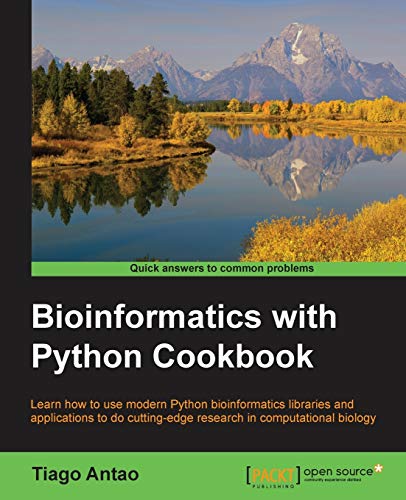Learn how to use modern Python bioinformatics libraries and applications to do cutting-edge research in computational biology
About This Book
- Discover and learn the most important Python libraries and applications to do a complex bioinformatics analysis
- Focuses on the most modern tools to do research with next generation sequencing, genomics, population genetics, phylogenomics, and proteomics
- Uses real-world examples and teaches you to implement high-impact research methods
Who This Book Is For
If you have intermediate-level knowledge of Python and are well aware of the main research and vocabulary in your bioinformatics topic of interest, this book will help you develop your knowledge further.
What You Will Learn
- Gain a deep understanding of Python's fundamental bioinformatics libraries and be exposed to the most important data science tools in Python
- Process genome-wide data with Biopython
- Analyze and perform quality control on next-generation sequencing datasets using libraries such as PyVCF or PySAM
- Use DendroPy and Biopython for phylogenetic analysis
- Perform population genetics analysis on large datasets
- Simulate complex demographies and genomic features with simuPOP
In Detail
If you are either a computational biologist or a Python programmer, you will probably relate to the expression "explosive growth, exciting times". Python is arguably the main programming language for big data, and the deluge of data in biology, mostly from genomics and proteomics, makes bioinformatics one of the most exciting fields in data science.
Using the hands-on recipes in this book, you'll be able to do practical research and analysis in computational biology with Python. We cover modern, next-generation sequencing libraries and explore real-world examples on how to handle real data. The main focus of the book is the practical application of bioinformatics, but we also cover modern programming techniques and frameworks to deal with the ever increasing deluge of bioinformatics data.
Tiago Antao
Tiago Antao is a bioinformatician. He is currently studying the genomics of the mosquito Anopheles gambiae, the main vector of malaria. Tiago was originally a computer scientist who crossed over to computational biology with an MSc in bioinformatics from the Faculty of Sciences of the University of Porto, Portugal. He holds a PhD in the spread of drug resistant malaria from the Liverpool School of Tropical Medicine, UK. Tiago is one of the coauthors of Biopython―a major bioinformatics package―written on Python. He has also developed Lositan, a Jython-based selection detection workbench. In his postdoctoral career, he has worked with human datasets at the University of Cambridge, UK, and with the mosquito whole genome sequence data at the University of Oxford, UK. He is currently working as a Sir Henry Wellcome fellow at the Liverpool School of Tropical Medicine.
![]()
